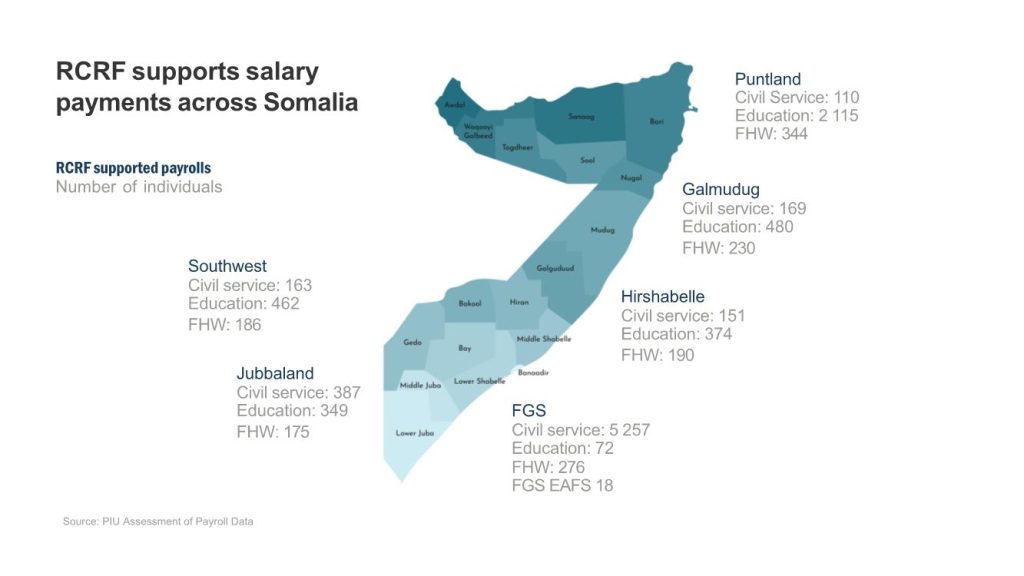In the wake of the establishment of the enduring Somali government in 2012, marked by the adoption of the Provisional Constitution that introduced a federal political structure, the Federal Government of Somalia (FGS), and five Federal Member States (FMS), Somalia embarked on an unwavering journey of successive national reform initiatives. These endeavors focused on constructing robust government institutions, laying the groundwork for national development programs, and reestablishing connections with international financial institutions.
One of the pivotal initiatives supporting these governmental aspirations is the Recurrent Cost and Reform Financing (RCRF) Project, initiated in 2014 and funded by the World Bank. This project has played a vital role in fortifying government legitimacy by assisting the Federal Government of Somalia (FGS) and Federal Member States (FMS) in enhancing their resource management systems, intergovernmental fiscal frameworks, and the delivery of essential services in healthcare and education. The RCRF Project encompasses four primary components: recurrent cost financing for resource management reform, the reinforcement of intergovernmental fiscal relations, funding for core government functions, and the establishment of fundamental educational and healthcare service delivery mechanisms in eligible FMS. Additionally, it emphasizes citizen engagement and feedback.
Throughout the implementation of this program, the RCRF Project has successfully provided financial support to over 11,500 individuals across Somalia, including 1,400 female health workers (FHWs) actively engaging communities on matters related to maternal care, family planning, immunization, nutrition, and other medical requirements. It has also funded 3,850 teachers to bolster local education reform efforts, as well as approximately 6,000 civil servants. The figures illustrating individual payroll support are provided below.

On another front, the project has played a pivotal role in the establishment of the Intergovernmental Fiscal Forum (IGFF), consisting of two platforms: the Intergovernmental Technical Level and the Finance Ministerial Level (IGFFTC FMFF). These platforms are designed to enhance intergovernmental relations and harmonize the efforts of government entities to promote fiscal cooperation and economic reforms. The IGFF program has achieved several significant milestones, including the creation of a grant allocation and fiscal transfer mechanism that ensures transparency and equity in the allocation of funds between the FGS and FMS. Furthermore, the IGFF has been instrumental in the distribution of functional and revenue assignments among the three levels of government, a process successfully concluded during the National Coordination Committee (NCC) meeting in March.
Other noteworthy achievements include the agreement on a unified sin tax rate policy, the signing of a Memorandum of Understanding between the FGS and the World Bank to enhance data transparency, monitoring, and reporting, as well as the facilitation of intergovernmental dialogues that have resulted in a consensus on the adoption of a unified Chart of Accounts.

In an effort to engage with the public, the RCRF Project has been instrumental in the establishment of a government-owned-and-led citizen engagement center known as the Talo Wadaag Center. This initiative aims to strengthen government-citizen relations and foster public trust in government service delivery. The Talo Wadaag Center facilitates two-way communication between the government and the public through various direct channels, including SMS, robocalls, agent calls, social media platforms such as WhatsApp, Facebook, and Twitter, as well as television and radio. This initiative has reached a diverse range of beneficiaries, including 850 Female Health Workers, 14,000 household heads, 1,000 pregnant mothers, and 1,700 teachers across the country. Additionally, the center plans to extend its reach to more marginalized community members, including nomadic communities in remote areas and individuals with disabilities, building on the success of the initial citizen engagement campaign, which reached over 17,500 beneficiaries. This effort has contributed to enhancing project transparency, accountability, and participatory governance throughout Somalia.
By further strengthening the citizen engagement initiative, the project embraces the theory of change and the social contract framework, amplifying the availability and transparency of social services in all beneficiary states. In line with the principles and guidelines of the World Bank’s Environment and Social Framework (ESF), the project has heightened national awareness of gender-based violence (GBV) and devised the GBV Action Plan, which prioritizes survivor-centric responses and accountability. Moreover, given the weak legislation and regulation of labor laws in Somalia, the RCRF Project is bridging the gap by addressing labor and security risks faced by women, such as sexual exploitation, abuse, harassment (SEAH), and other forms of violence occurring during the recruitment or retention of female workers in both healthcare and education services. To facilitate this, the project has established the grievance redress mechanism (GRM), allowing the public to submit grievances. Since the center’s official launch in 2022, the project has recorded 169 GRM cases, of which 125 were effectively resolved, boasting a success rate of 74%. This mechanism has led to behavioral change within communities, as evidenced by the weekly submission of GRM cases.
As the project continues its implementation, governmental entities continue to rely on RCRF’s support across various dimensions, including the decentralization and localization of reform efforts, the reinforcement of the government’s reform agenda through incentive-based mechanisms, support for intergovernmental fiscal relations, and increased investments in social service delivery. The RCRF Project continues to set a remarkable example through its capacity to shape political governance and institutional development in the fields of social service delivery and governance.
Authors:
RCRF Project Implementation Unit (PIU)
Twitter: @RcrfSomalia
Email: – rcrfpiucommunication@gmail.com

